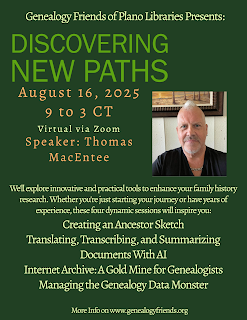I returned from a recent trip with images of a book published in Baden in 1842. A distant cousin had the book. She was told that Gottlieb Ziebold brought the hymm book with him when he emigrated to America in May 1851. The first three blank pages were filled with information about the family of Gottlieb Ziebold and Maria Magdalena Schnaiter. The couple emigrated along with his brother and her sister. Both couples married in New York City shortly after they arrived. They traveled west to Ross County, Ohio where other family members, who had emigrated earlier, were living. Nine years later both couples along with other family members again headed West and settled in California, Moniteau County, Missouri.

My goal was to translate the family information recorded on the book's pages. I started by uploading images of the first three pages to ChatGPT and asked it to translate the text from German to English. I have numerous German ancestors and have worked with old German handwriting for these families enough to be able to read the names, dates, and places, so I knew that some of the translations provided by ChatGPT were incorrect. Coincidentally, I received an email from Katherine Schober of Germanology Unlocked saying that ChatGPT was having difficulty reading old German handwritten documents. It is deceiving because it provides a translation, however it is not accurate.
I uploaded the same images to Transkribus, an AI tool designed for translations. This gave me a German transcription. I took the German text from Transkribus and used DeepL to translate it into English. I still wasn't satisfied, so I used a Schrift Generator. I typed in the German words and selected the font that looked like the handwriting in the book. This way, I could compare what was written on the page to what the AI tools had produced. Some of it matched, and some didn't. I went back to DeepL and typed in the English words for what I thought the text was. Using the German translation, I put them into the Schrift Generator.
Translating the cover page of the book and some of the printed pages was much easier. I used Transkribus and DeepL. The translation was excellent; there was one problem with a location. This was easy to correct since I was familiar with the geography of Baden.
The Evangelical Protestant prayer book, published in Karlsruhe, Baden in 1842, belonged to Michael Schnaiter, Maria Magdalena's father. The earliest date recorded was 15 January 1848. The information provided included Gottlieb's birth date, 4 November 1822, and his parents' names and ages - G Ziebold, age 63, and Katharina Lauer, age 60. These would have been their ages in 1848 based on church records from the Evangelical Parish in Wagenstadt, Baden.
Page 2 started with Maria Magdalena's birth date, 5 October 1833, and the names of her parents, Michael Schnaiter and Catharina Markstahler, who had eight children.[Supported by the Evangelical Church records from Broggingen, Baden.] It goes on to say that Maria Magdalena and Gottlieb emigrated to America in May 1851. [Supported by the passenger list for the ship Samuel Fox.] The information that followed was for the first six children of Gottlieb and Maria Magdalena:
Wilhelmina, born 7 February 1854 at 4:00 in the morning. Baptized 8 May 1854. [Supported by her age on the 1860 U.S. census.]
Gottlieb Nelson, born 14 July 1857. Baptized 1 November 1857. [Supported by the baptismal record at the Evangelical Church in Chillicothe, Ross County, Ohio.]
George Washington Ziebold, born 1 March 1860 at 8:00 in the morning. [Supported by his death certificate.]
Maria Magdalena Katharina born 8 March 1862. Baptized 19 March 1862. [Supported by Record of Pleasant Grove Lutheran Church, Saline Township, Cooper County, Missouri.]
Maria Magdalena born 15 September 1863 at 1:00 in the morning. Baptized 3 February 1864. [Supported by Confirmation Record, St. Paul Evangelical Church, Waterloo, Monroe County, Illinois.]
Karl Friedrich born 25 April 1866. Baptized 29 July 1866. [Supported by Baptism record from the United Church of Christ, California, Moniteau County, Missouri.]
The pages all appear to be in the same handwriting and ink. It isn't possible to determine if the information was recorded as each event happened. There was a card in the book from Mary [Maria Magdalena Ziebold] and her husband, Francoise Bonnet, indicating that the cover of the book was a Christmas gift from them to her sister, Wilhelmina Ziebold Rickert, dated 1899.
This book is a family treasure and I'm grateful to my cousin for sharing it. It took a lot of back and forth and using a combination of the four tools, but it was definitely easier than trying to read the old German handwriting and hunting through a dictionary to identify words.

.png)








.png)



